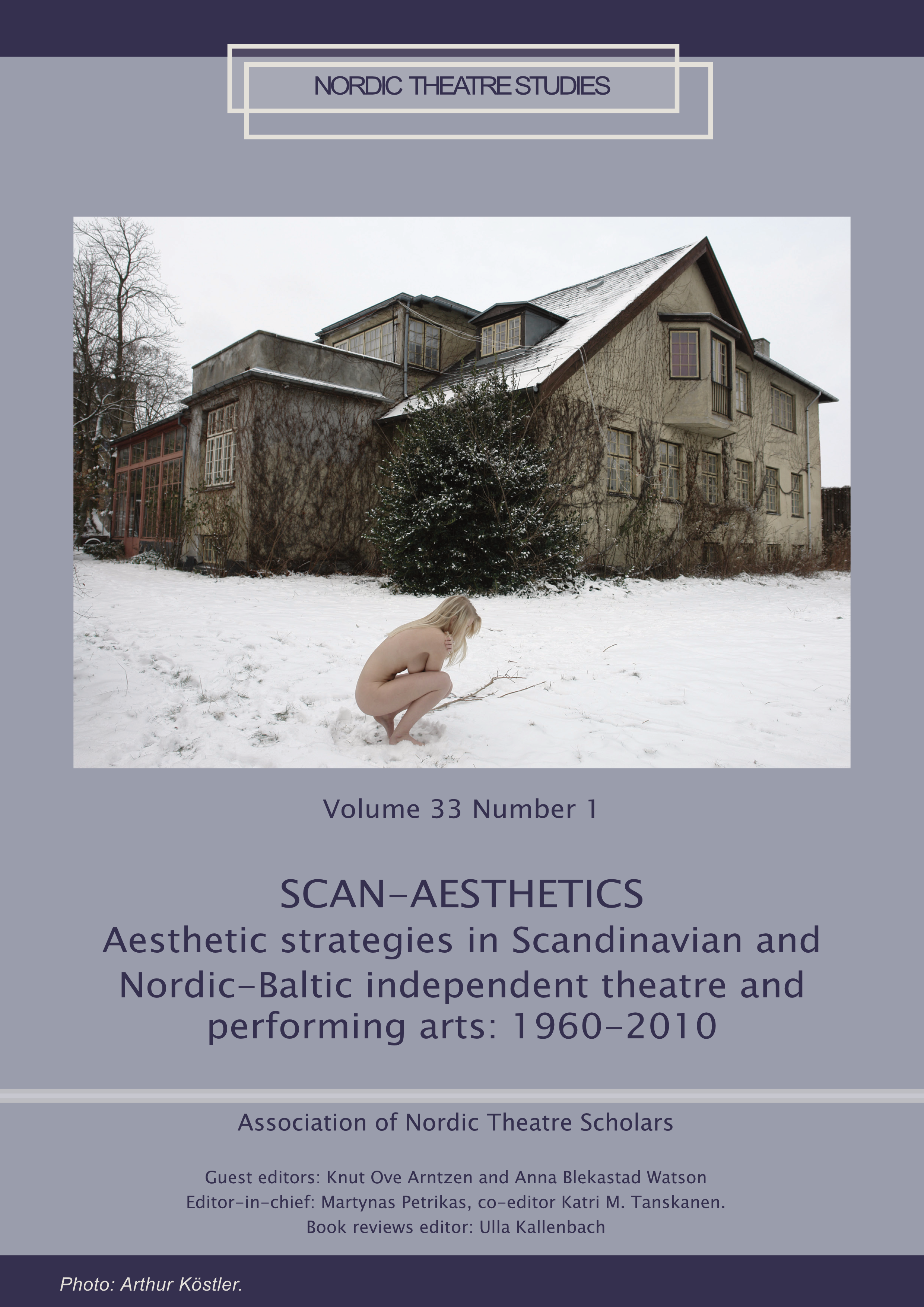Aesthetics and Dramaturgies of Immersive and Interactive Theatre Since the Turn of the Millennium
SIGNA – Poste Restante – Sisters Hope
DOI:
https://doi.org/10.7146/nts.v33i1.131990Keywords:
Aesthetics and Dramaturgies, Immersive theatre, SIGNA, Poste Restante, Sisters HopeAbstract
Since the turn of the millennium, stage art has seen an increased interest in adopting and developing interactive and immersive aesthetics. This
article offers a comparative study of two Danish groups, SIGNA and Sisters Hope, and one Swedish group, Poste Restante. The visual dimension of the
performances by these three groups is striking, which may be partly attributed to the interconnections between the artists that has allowed a flow of ideas
and strategies to occur between one group and the other. Looking at these connections, it appears that there is a line going from SIGNA (established in
2001) to Poste Restante (established in 2007) and to Sisters Hope (established in 2014). Whilst there are similarities, there are also great differences in terms
of the aesthetics and dramaturgies of these groups, which reflect political, ethical, and ideological differences in the context of Nordic societies. The paper
investigates these aspects through their relations to the audience: how is the audience included in a performance? And what is the purpose of applying an
interactive and immersive aesthetics?
References
Louise Bagger, “Flirtation and Seduction as Dramaturgical devices in Interactive Acting”, in Nordic Theatre Studies No. 24, 2012, 108-119.
Franzinska Bork-Petersen, Authenticity and Its Challenges, PhD thesis. Stockholm: Stockholm University, 2013.
Monna Dithmer, “Grænsegængere: Performative strategier hos Das Beckwerk og SIGNA i kampzonen mellem fiktion og virkelighed”, in Christa Lykke Christensen and Anne Jerslev (eds.), Hvor går grænsen? Brudflader i den moderne mediekultur. Copenhagen: Tiderne Skifter, 2009.
Joshua Edelman and Kim Skjoldager-Nielsen, “Liminality”, in Ecumenica: Journal of Theatre and Perfomance, Vol. 7, No. 1/2, 2014, 33-40.
Gry Worre Hallberg, The Sensuous Society: Carving the Path towards A Sustainable Future through Aesthetic Inhabitation Stimulating Ecological Connectedness, PhD thesis. University of Copenhagen, 2021.
Anita Hammer, “Exploring Ritual Dynamics by Means of Fiction: The Non-Ethics of the In-between”, in Daniel Meyer-Dinkgräfe (ed.), Consciousness, Theatre, Literature and the Arts. Newcastle: Cambridge Scholars Publishing, 2007.
Rachel Hann, Beyond Scenography. New York: Routledge, 2018.
Hildegard of Bingen, Scrivias. New York and Mahwah: Paulist Press, 1990.
Dorthe Jørgensen, Historien som værk, værkets historie. Aarhus: Aarhus Universitetsforlag, 2006.
Anne Ring Petersen, “Between Image and Stage: The Theatricality and Performativity of Installation Art”, in Rune Gade and Anne Jerslev (eds.), Performative Realism: Interdisciplinary Studies in Art and Media. Copenhagen: Museum Tusculanum Press, 2005, 209-234.
Hartmut Rosa, Resonance: A Sociology of Our Relationship to the World. Cambridge: Polity Press, 2019.
Willmar Sauter, “Immersion”, in Shirin Rai, Milija Gluhovic, Silvija Jestrovic, and Michael Saward (eds.), The Oxford Handbook of Politics and Performance. Oxford: Oxford University Press, 2021.
Kim Skjoldager-Nielsen, “Who Am I Now Who Am I Here?”, in Sibila Petlevski and Goran Pavlic (eds.), Spaces of Identity in the Performing Sphere. Zabgreb: Fraktura, 2011, 65-90.
Kim Skjoldager-Nielsen, “Signas Salò: affekt og non-etisk katastrofe”, in Peripeti, No. 17, 29 38.
Kim Skjoldager-Nielsen, Over the Threshold, Into the World: Experiences of Transcendence in the Context of Stage Events, PhD thesis. Stockholm University, 2018.
Signa Sørensen, “Mit kunstneriske virke”, in Mette Burmeister Clemmensen and Sanne Vils Axelsen (ed.), Signa Sørensen præsenterer: The Black Rose Trick. Copenhagen: Skoletjenesten, 2005.
Gareth White, “On Immersive Theatre”, in Theatre Research International, Vol. 37, No. 3, 2012, 221-235.
Downloads
Published
How to Cite
Issue
Section
License
The copyright belongs to the authors and Nordic Theatre Studies. Users can use, reuse and build upon the material published in the journal but only for non-commercial purposes. Users are allowed to link to the files, download the files, distribute the files on a local network (preferably by links), upload the files to local repositories if their institutions require them to do so, but not republish the files without proper agreements with the journal and the author.

